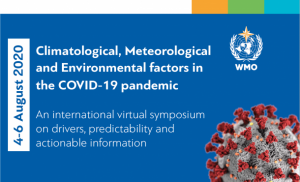
Global COVID-19 infections are currently reported at more than 16.9 million confirmed cases, and over 663 000 deaths. The coronavirus pandemic continues to spread globally, within a wide range of climates and seasonal and environmental settings. There is no evidence that environmental conditions are the principal drivers of the first wave of the pandemic. However, questions remain as to whether factors such as temperature, humidity, air quality and ultraviolet light influence the spread of the coronavirus. It is against this background that the World Meteorological Organization (WMO) and its international scientific partners are hosting a virtual global symposium from 4 to 6 August. The symposium will review the relationship between weather, climate and environmental factors vis-à-vis the spread of COVID-19. South African scientists have championed the organising of this event which will be officially opened by the South African Minister of Science and Innovation, Dr Blade Nzimande.
Some countries currently facing the highest COVID-19 burdens are located in the tropics and subtropics. The onset of winter saw an increase of cases in the southern hemisphere. South Africa now has the fifth-highest number of confirmed coronavirus cases in the world and currently accounts for more than 50% of cases in Africa. The country is reaching its peak during the mid-winter season, at the same time that the typical influenza season peaks, hence, “the role that climate plays could be important, both at this time, and in the winter season of 2021”, said Dr Neville Sweijd, convener of the Covid-19 Environmental Reference Group (CERG[1]) and Director of the ACCESS programme. Professor Jürg Luterbacher, WMO Chief Scientist and Director of Science and Innovation highlighted that “It is critical to understand whether meteorological, climatological and environmental factors promote the spread of the disease either outdoors or indoors. This is a pertinent scientific question that is the subject of numerous studies”.
SASSCAL Executive Director, Dr Jane Olwoch, is a member of the symposium’s scientific committee. She lamented that “preparedness towards pandemics remains low globally and this results in mortality and subsequent social, economic and political disruptions. Noting that in some of the weak economies in Africa and elsewhere such economic disruptions make them more and more reliant on international loans with no hope for quick recoveries”. Dr Olwoch further cautioned that although history has evidence of pandemics and their impacts, today’s current and future pandemics should be expected because of the global village we live in and not to mention land use and cover change and over-exploitation of the natural environment. She called upon more and coordinated research in this area in order to untangle the complexity in understanding infectious diseases dynamics towards a strengthened preparedness.
“COVID-19 is likely to be prevalent beyond the initial pandemic phase for several years. Better understanding of whether it will be influenced by seasonal environmental and weather conditions, as is the case with many other respiratory viruses and diseases, will help inform public health policy and management of the disease in the coming months and years,” said Dr Joy Shumake-Guillemot of the WMO/World Health Organization Joint Climate and Health Office.
The symposium was initiated by a team of researchers from Johns Hopkins University, WMO and ACCESS programme in South Africa, and co-hosted by a wide range of including FutureEarth among others. Around 500 Participants from 30 countries have registered for the event. Registration is free. Symposium proceedings will be published by Elselvier OneHealth journal.
The outcomes of the conference will also support the work of a newly established WMO Research Board Task Team on COVID-19 and climate and environmental factors, which will provide official scientific direction on the topic through 2021.
For further information contact Joy Shumake-Guillemot
Email: JShumake-Guillemot@wmo.int
Or Dr Neville Sweijd: nsweijd@access.ac.za
[1] CERG comprises several experts from several local institutions, several of whom will be presenting their work on Covid-19 at the symposium.




